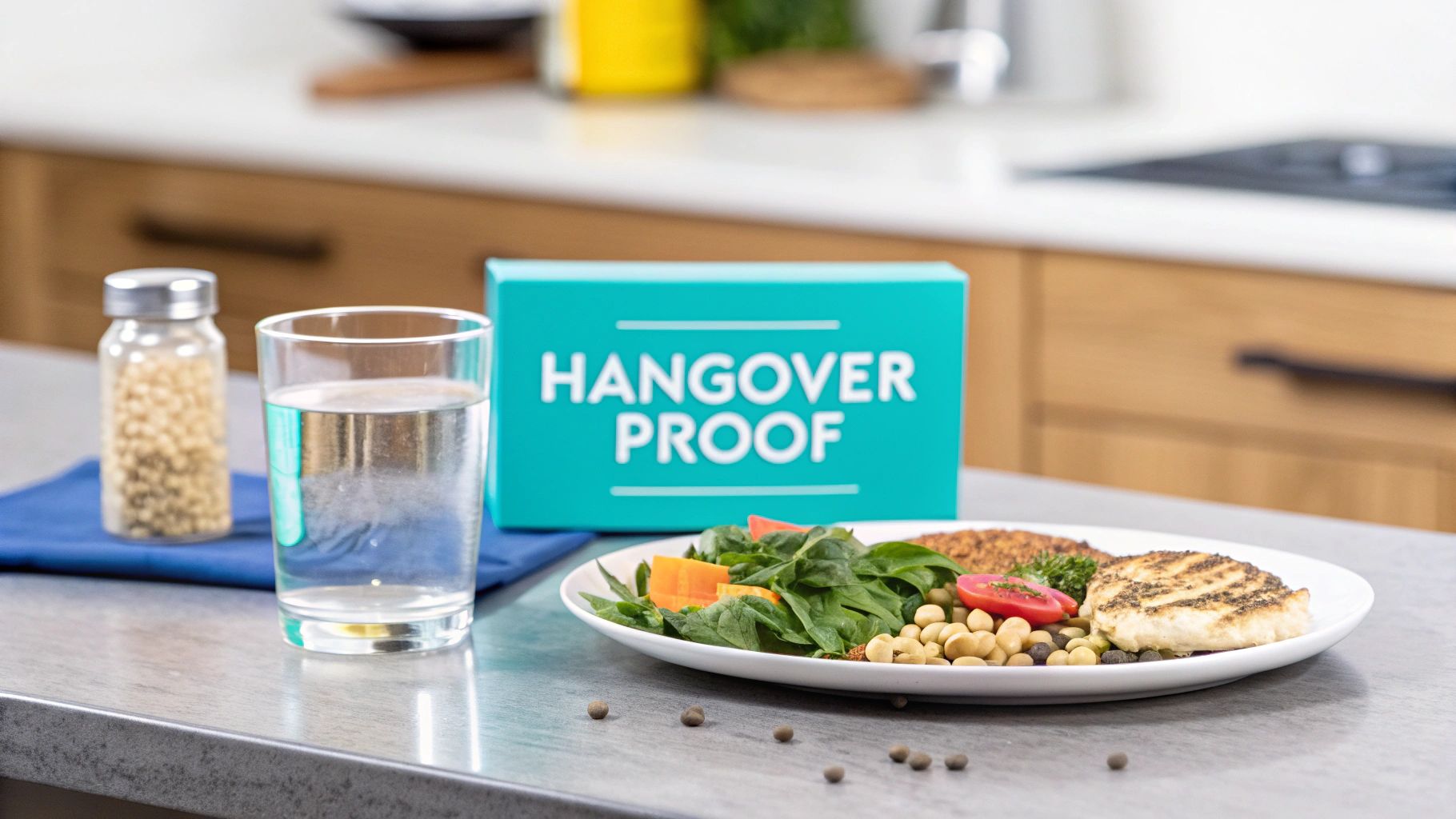

· By Annemarie
How to Prevent a Hangover Before Drinking: Expert Tips
Forget trying to find a mythical hangover "cure" the morning after. The real secret? It’s all about prevention—stopping a hangover in its tracks before it even starts.
If you want to know how to prevent a hangover before drinking, you just need to focus on three simple things: strategic hydration, smart nutrition, and conscious consumption. Getting these right before you take your first sip is the game-changer that sets you up for a much better morning.
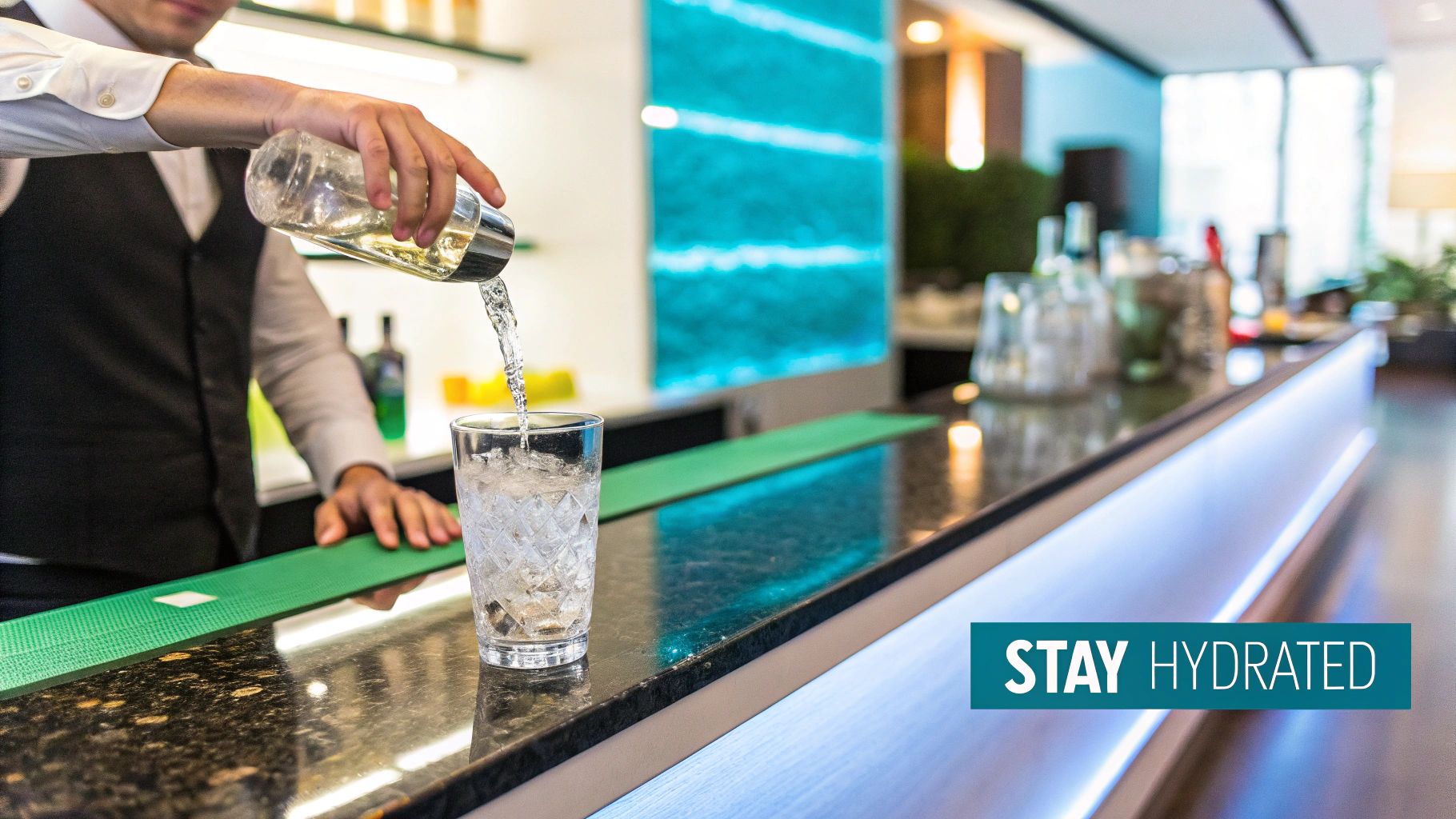
Build Your Pre-Drinking Defense
Most of us wait until we’re already miserable to start chugging water and popping ibuprofen. But the most effective moves happen hours before the party even begins.
Think of it like getting ready for a big race. You wouldn't just roll out of bed and run a marathon without fueling up or hydrating properly, right? The same logic applies here. Prepping your body for a night of drinking can make a world of difference in how you feel the next day.
The two main villains behind that pounding headache and queasy stomach are dehydration and the toxic byproducts your body creates when it metabolizes alcohol. A little proactive planning tackles both of these head-on.
The Key Pillars of Prevention
Don’t worry, your pre-game routine doesn’t have to be complicated. It really just boils down to a few intentional choices that give your body the backup it needs. These simple preparations help your system process alcohol way more efficiently and fight off its dehydrating effects from the get-go.
Nailing these key areas will seriously upgrade your morning-after experience:
- Strategic Hydration: Start drinking water well before you have your first alcoholic drink. This creates a solid fluid buffer.
- Smart Nutrition: A balanced meal slows down alcohol absorption, giving your liver a fighting chance to keep up.
- Conscious Consumption: Knowing which drinks to choose and how to pace yourself is fundamental to feeling good tomorrow.
A proactive approach isn't about some magic potion; it’s about making simple, smart choices that support your body. Shifting your mindset from reactive to preventative is the ultimate hangover hack.
To make it super simple, here's a quick checklist you can use before your next night out. Think of it as your pre-flight rundown for a smooth landing the next morning.
Your Pre-Drinking Hangover Prevention Checklist
This is your at-a-glance guide to the most effective actions you can take before you start drinking to keep hangover symptoms at bay.
| Action | Why It Works | Simple How-To |
|---|---|---|
| Hydrate Early & Often | Alcohol is a diuretic (it makes you pee more), so you need to front-load on fluids. | Drink a few big glasses of water in the hours leading up to your first drink. |
| Eat a Real Meal | Food in your stomach, particularly fats and protein, slows down how quickly alcohol hits your system. | Aim for a meal with protein, healthy fats, and complex carbs about 1-2 hours before you go out. |
| Choose Your Drinks Wisely | Darker liquors and wines are high in congeners, compounds that make hangovers worse. | Stick to clear spirits like vodka, gin, or light rum. If you're drinking wine, go for white over red. |
Following these simple steps isn't a guarantee against all effects, but it's the absolute best way to give your body the support it needs to handle the night and help you wake up feeling human.
Hydration: Your First Line of Defense
It might sound obvious, but water is hands-down your best friend when you're trying to get ahead of a hangover. But it’s not just about chugging a glass right before you walk out the door. Knowing why it works and how to do it strategically is what separates a fresh morning from a day of misery.
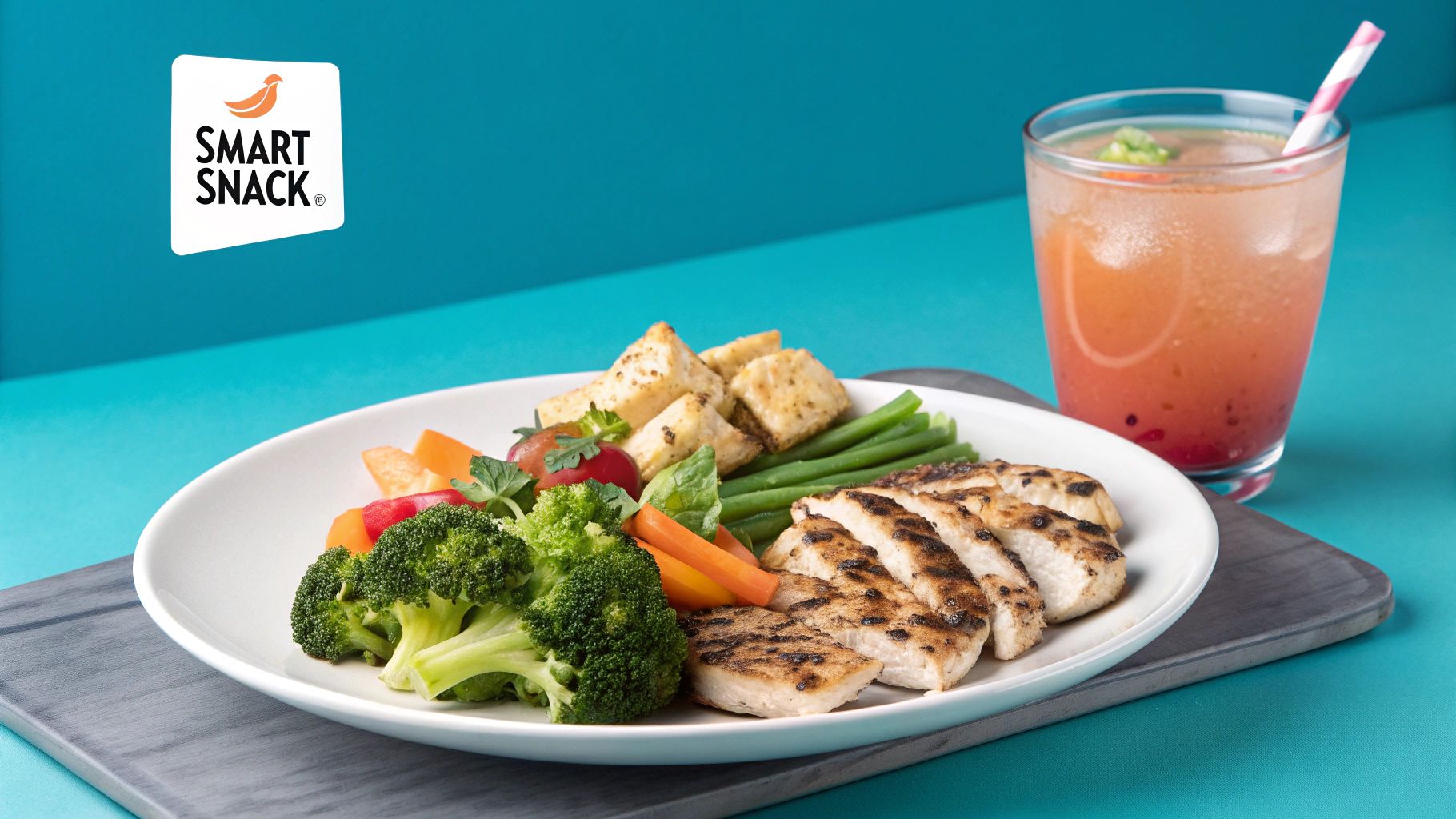
Here's the deal: alcohol is a diuretic, which is a fancy way of saying it makes you pee a lot. This process doesn't just get rid of water; it also flushes out vital minerals, leading to dehydration. That’s the real culprit behind the pounding headache, sandpaper mouth, and crushing fatigue you feel the next day. We get into the nitty-gritty of why alcohol dehydrates you in another post if you want to dive deeper.
To do it right, think of hydration as a marathon, not a sprint. The real goal is to build up a reserve of water in your system before your first drink. Try to down several extra glasses of water in the hours leading up to your night out.
Don't Forget Your Electrolytes
Water is a huge piece of the puzzle, but it’s not the whole story. When you’re losing fluids, you're also losing essential electrolytes like potassium and sodium—the minerals your body needs for nerve function, muscle control, and keeping everything in balance.
Topping them off before you start drinking is a pro move. It’s actually pretty simple:
- Grab an electrolyte drink: Just be sure to check the label for a low-sugar option.
- Eat smart: Foods like bananas and avocados are loaded with potassium.
Pro Tip: I swear by the "one-for-one" rule. For every cocktail or beer, have a full glass of water. A great little social hack is to order sparkling water with a lime. It looks just like a gin and tonic, no one will ask questions, and it helps you pace yourself without even thinking about it.
Does It Really Work?
This isn't just talk—staying on top of your water intake has a massive impact. Research has shown that drinking water before and during alcohol consumption can seriously dial down the intensity of a hangover. One study even found that people who drank water with their alcohol reported hangover symptoms that were 50% less intense than those who didn't. You can see how global health experts like the World Health Organization view the connection between alcohol and hydration, too.
Fueling Your Body With The Right Pre-Drinking Meal
Walking into a party or a bar on an empty stomach is one of the fastest tickets to a miserable morning after. We've all been there. Think of a proper pre-drinking meal as your first line of defense; it’s the buffer your body desperately needs before alcohol enters the picture.
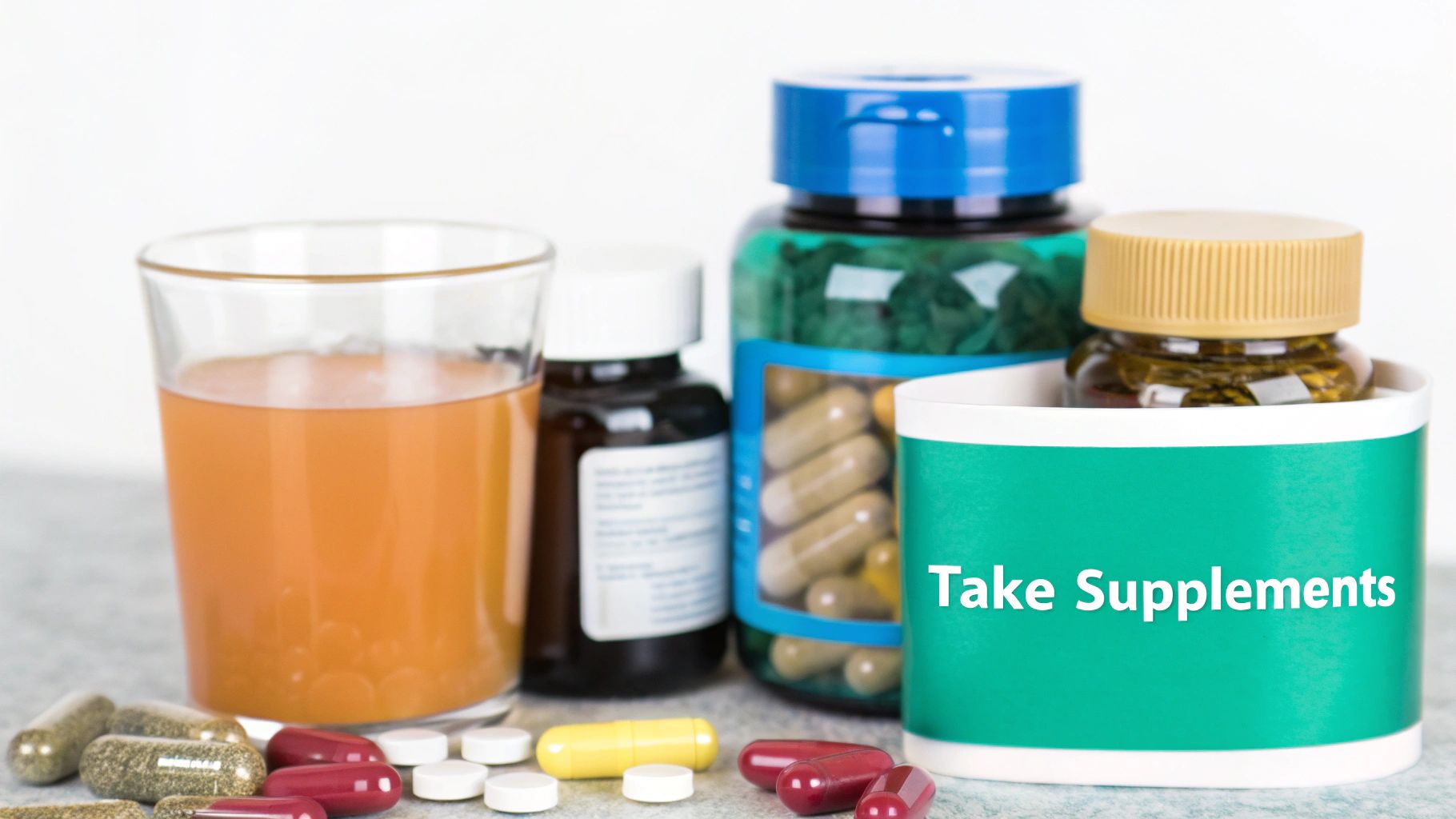
Food in your stomach—especially meals rich in healthy fats, protein, and complex carbohydrates—physically slows down how quickly alcohol gets absorbed into your bloodstream. It doesn't stop the alcohol, but it does control the pace, giving your liver a much better chance to process it all without getting completely overwhelmed.
When you drink on an empty stomach, alcohol rushes right into your system, causing a rapid spike in your blood alcohol concentration (BAC). A balanced meal effectively puts the brakes on this whole process.
Building Your Foundation
The real key here is to focus on a combination of macronutrients that will keep your stomach busy. This means creating a meal that is both satisfying and strategic.
- Lean Protein: Options like grilled chicken or fish provide amino acids that can help support your liver function.
- Healthy Fats: Avocado or olive oil are fantastic choices because fats are digested slowly, creating a sustained buffer against that rapid alcohol absorption.
- Complex Carbohydrates: Foods such as sweet potatoes or brown rice offer a slow release of energy and help keep your blood sugar levels from going on a rollercoaster.
A meal like salmon with a side of quinoa and roasted asparagus checks all these boxes perfectly. This approach is way more effective than just grabbing a handful of salty, simple carbs like pretzels, which do next to nothing to slow things down.
For some more great ideas, check out our guide on the best foods to eat before drinking.
To make it even simpler, here's a quick cheat sheet on what to reach for and what to skip.
Smart Pre-Drinking Meal Choices
| Food Category | Best Choices (Eat These) | Worst Choices (Avoid These) |
|---|---|---|
| Proteins | Grilled chicken, salmon, tofu, eggs, Greek yogurt | Fried meats, processed deli meats, fatty red meat |
| Fats | Avocado, nuts, seeds, olive oil | Deep-fried foods, heavy cream sauces, greasy pizza |
| Carbohydrates | Sweet potatoes, brown rice, quinoa, whole-wheat pasta | White bread, sugary snacks, potato chips, french fries |
Basically, you want to stick with whole, nutrient-dense foods that provide sustained energy and slow down absorption. Greasy, sugary, and highly processed foods might seem tempting, but they often do more harm than good.
The science totally backs this up. Eating a meal with carbs and fats before drinking can significantly delay how fast your stomach empties. A 2020 analysis showed that people who ate a solid meal before drinking experienced up to 40% lower peak blood alcohol levels. It really makes a difference.
Choose Your Drinks Wisely
What you pour into your glass matters just as much as what you ate for dinner. Seriously. Not all drinks are created equal when it comes to the morning after, and the biggest culprit is a group of chemical compounds called congeners.
These guys are the natural byproducts of fermentation and aging. They’re what give drinks like bourbon, red wine, and aged tequila their deep colors and complex flavors. While they add plenty of character, they're also a massive reason why your hangover can feel so brutal.
Congeners: The Hangover Culprit
There’s a simple rule of thumb here: the darker the drink, the more congeners it has.
Think of it like this—on one end of the spectrum, you have clear spirits like vodka and gin. They’re highly distilled and filtered, which strips out most of those nasty congeners. This makes them a much smarter bet if you're trying to have a smoother morning.
At the other end, you'll find dark liquors like whiskey and brandy, along with most red wines. They are absolutely loaded with these hangover-fueling compounds. Making a conscious effort to stick with low-congener drinks can make a world of difference.
Take a look at this chart. The difference is pretty stark.
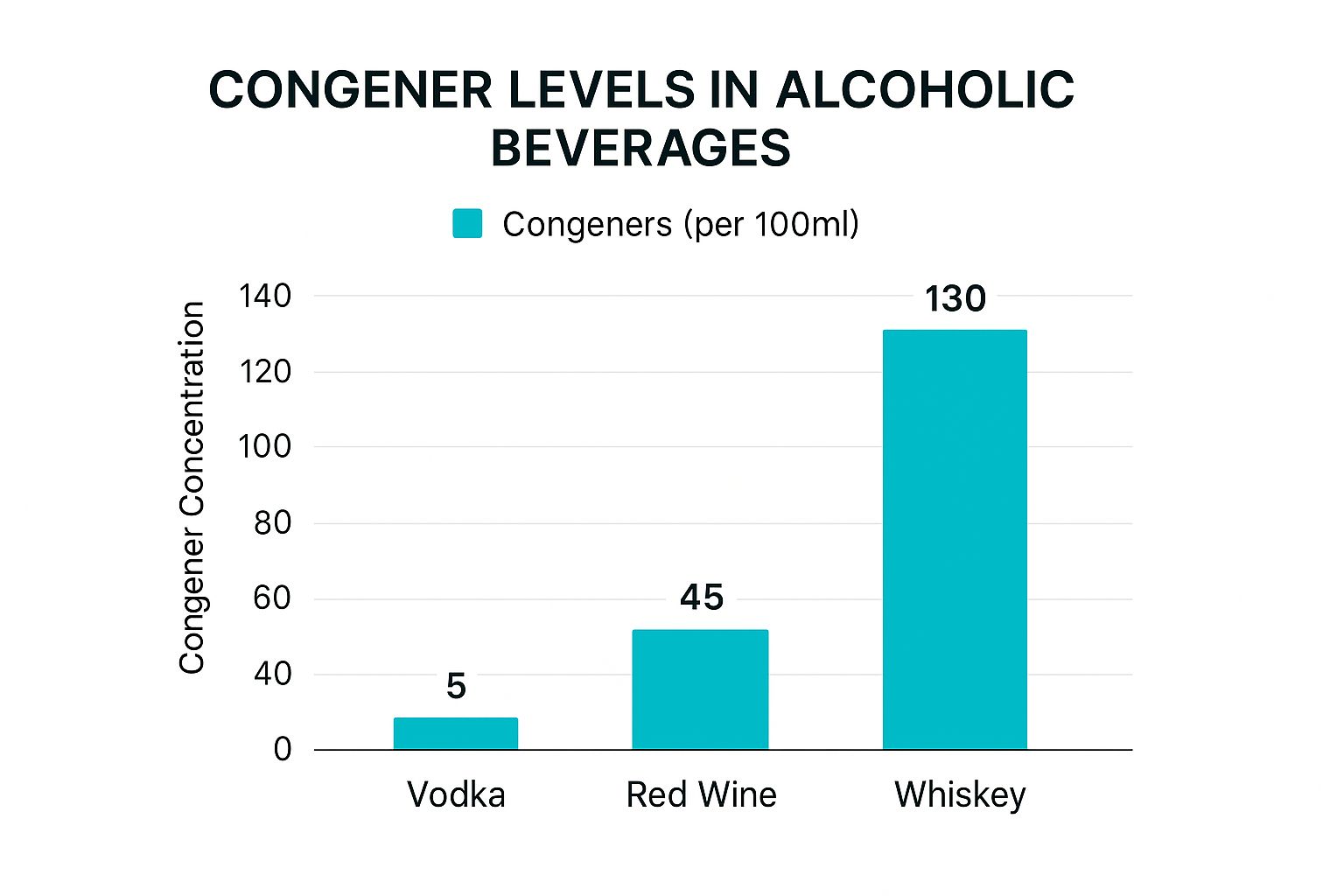
As you can see, whiskey has exponentially more congeners than vodka. It’s not even close.
Congener Content In Common Drinks
To make it even clearer, here’s a quick guide to the typical congener levels in popular drinks. Use this to make smarter choices next time you're ordering.
| Drink | Congener Level | Hangover Potential |
|---|---|---|
| Vodka | Very Low | Lowest |
| Gin | Low | Low |
| White Wine | Low | Low |
| Beer | Low-Medium | Low-Medium |
| Whiskey | High | High |
| Red Wine | High | High |
| Brandy | Very High | Highest |
Keep this ranking in mind. Choosing from the top of the list instead of the bottom can dramatically reduce the toxic load on your body.
Watch Out For Mixers and Bubbles
Don’t forget about what you're mixing your drink with. All those sugary sodas, juices, and especially energy drinks will send your blood sugar on a rollercoaster, making you feel even more fatigued and nauseous the next day.
Carbonation is another sneaky one. The bubbles in champagne, prosecco, or your vodka soda actually speed up how fast your body absorbs alcohol. This gives you a quicker, higher spike in your blood alcohol level and puts a lot more stress on your system.
Honestly, one of the easiest and most effective moves you can make is switching from a dark, sugary cocktail to a clear spirit mixed with soda water and a squeeze of lime. It’s a simple trade that your body will thank you for.
Pacing Yourself And Listening To Your Body
All the prep work in the world won't save you if you don't manage your drinking throughout the night. Honestly, the most powerful tool you have for stopping a hangover in its tracks is your own awareness.
It's all about mindful drinking, which really just means knowing your body's limits. Your liver can only handle about one standard drink per hour. When you go faster than that, you're basically overwhelming its ability to keep up, which leads to a spike in your blood alcohol level and a much, much rougher morning.
Slowing down doesn't have to be complicated. I've found a simple trick is to just put your glass down on the table between sips instead of holding onto it. Another pro-tip: try to avoid letting anyone "top off" your drink. When that happens, it's almost impossible to keep track of how much you've actually had.
The Art Of Alternating
One of the most effective strategies I know for pacing is the classic "one-for-one" rule. For every alcoholic drink you have, follow it up with a full glass of water or something non-alcoholic.
This simple habit is a game-changer for two big reasons:
- It keeps you hydrated, which is half the battle.
- It naturally slows you down, giving your body the time it needs to process everything.
Key Takeaway: Staying in control isn't about cutting your fun short; it’s about making it last longer. Smart pacing means you can enjoy the entire evening and wake up feeling human. That's the real win.
At the end of the day, the best advice for preventing a hangover is to just listen to your body. If you start to feel that tell-tale buzz or a wave of tiredness, that's your cue to switch to water and take a breather.
Learning to resist the social pressure to "keep up" is a sign of self-respect, not weakness. For more on that, you can dive into our guide on how to drink responsibly.
Got Questions? We've Got Answers
Even with the best intentions, you might still have a few questions rolling around. The world of hangovers is full of myths and "I heard from a friend" advice, so let's set the record straight on a few common ones.
So, Do Hangover Supplements Actually Work?
This is the big one, and the honest answer is: it's complicated. A lot of supplements out there promise the world, but not all of them deliver.
What we do know is that certain ingredients show real promise. Compounds like Dihydromyricetin (DHM) and essential nutrients like B vitamins are known to give your liver's metabolic processes a helping hand.
Think of a quality supplement as a support system for your body, not a free pass to overdo it. They’re meant to complement your smart decisions—like hydrating and eating a real meal—not replace them entirely.
Does a Late-Night Food Run Help?
We’ve all been there. After a few drinks, that greasy slice of pizza or a giant burrito sounds like the perfect solution. But sadly, this is mostly a myth. By the time you’re eating after a night out, the alcohol is already well on its way into your bloodstream.
The real game-changer is the meal you have before you even take your first sip. That's what slows down alcohol absorption and gives your body a fighting chance. Sure, that late-night snack might help your blood sugar, but it won't stop a hangover that's already knocking at the door.
The most crucial meal is the one that comes first. Eating a balanced meal before your first drink is a non-negotiable step in any effective hangover prevention strategy.
What About "Beer Before Liquor..."?
You know how it goes: "Beer before liquor, never been sicker. Liquor before beer, you're in the clear." It’s a catchy little rhyme, but scientifically, it holds no water. Your body doesn’t care about the order of your drinks; it only cares about the total amount of ethanol you consume.
The real issue with mixing is that it makes it a nightmare to keep track of how much you're actually drinking. When you jump from a 5% ABV beer to a 40% ABV shot, it's easy to lose count and go way over your limit. At the end of the day, it's the quantity, not the sequence, that gets you.
Can I Avoid a Hangover by Sticking to One Type of Drink?
This can definitely help, but it's not a magic bullet. Choosing one type of drink—especially a low-congener option like vodka or gin—makes it much easier to pace yourself and monitor your intake. You also avoid accidentally mixing drinks with different levels of those nasty hangover-causing congeners.
But the main rule still applies: volume is everything. Downing seven vodka sodas will still leave you feeling pretty rough the next morning, even if vodka is a "smarter" choice than, say, a dark rum. Moderation is always king, no matter what's in your glass.
Ready to give your body the ultimate support before your next night out? Upside packs key ingredients like DHM and B vitamins into a convenient, great-tasting jelly stick. Just take one before you drink to help your body process alcohol more efficiently and wake up feeling your best. Try it for yourself and feel the difference at https://enjoyupside.com.
